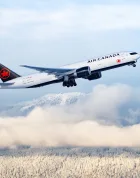A few days ago, Canada added new travel restrictions for travel from seven Southern Africa countries, banning entry to foreign nationals and enforcing testing and quarantine for Canadian residents who have been in those countries over the past 14 days.
Today, this policy has been further expanded to include three more countries: Egypt, Nigeria, and Malawi. All in all, this list now includes Botswana, Egypt, Eswatini, Lesotho, Malawi, Mozambique, Namibia, Nigeria, South Africa, and Zimbabwe.
Furthermore, “in the coming days”, on-arrival testing will be implemented for all international travellers except those returning from the United States, including fully vaccinated travellers.
COVID-19 Arrival Testing to Be Reintroduced
In what feels like déjà vu, on-arrival COVID-19 tests will once again be required for all air travellers entering the country from every destination, except the United States. This is in addition to the pre-flight COVID-19 molecular test for trips longer than 72 hours.
Fully vaccinated travellers must self-isolate at a location of their choosing until they receive the results of their on-arrival test.
Unvaccinated travellers will, first and foremost, be banned from boarding flights departing from Canadian airports as of today, November 30, as part of the new rules for air travellers. Upon landing in Canada, they must still quarantine for 14 days and complete testing on arrival as well as on Day 8.
Furthermore, they will have quarantine at a designated facility while they wait for the results of their on-arrival test, after which they can then complete the rest of their quarantine at a location of their choosing.
As a reminder, travellers who have left the country for less than 72 hours will not be required to complete a pre-entry COVID-19 molecular test (except those who were in the aforementioned African countries), but they will have to complete the new on-arrival test.
ArriveCAN is still required as per usual.
For travellers who have an onward connecting flight within Canada, it seems you will still complete the on-arrival COVID-19 test at the first port of entry, but can continue travelling and then quarantine at home until you receive results.
While the on-arrival tests will be free of charge for the traveller, it remains to be seen whether the tests will be administered at the airport or if travellers will simply be given Switch Health Test Kits to self-administer at home.
None of the above applies to travellers returning via land – who will simply need to present their pre-entry COVID-19 molecular test (for trips longer than 72 hours) and be well on their way.
For travellers returning from the 10 African countries for which Canada has implemented special restrictions, here’s a summary of what will be required:
Have a negative COVID-19 molecular test in the country from which your direct flight from Canada originates
Complete on-arrival testing
Quarantine at a designated facility until your results arrive
Quarantine the remainder of 14 days at home
The on-arrival test occurs at the first port of entry into Canada, where you will have to wait for results before proceeding to travel intra-Canada.
If you have been in one of the 10 African countries, but are returning to Canada via the land border, you can proceed directly to the quarantine location of your choosing with the testing requirements still in place.
In theory, this sounds like the preferred way to enter – except the United States has already enacted a travel for many of the same countries.
We Haven’t Learned from Past Ineffective Travel Policies
I don’t need to be a doctor to see that the Omicron variant is already in multiple countries around the world, including right here in Canada.
It’s already in Belgium, Denmark, Germany, among other European countries. Sure, these places have looser border restrictions, so let’s look elsewhere: it’s also in Australia, Hong Kong, and Japan, which implement some of the most rigorous entry requirements in the world.
Given the above, does it make any sense at all to only implement a travel ban on certain African countries, and nowhere else? By the time Omicron was sequenced then spread, it’s likely already circulating in the greater population almost everywhere.
Furthermore, travellers connecting to domestic destinations in Canada are still allowed to take a subsequent flight to self-isolate at home after completing their on-arrival test at their first port of entry. Should they test positive, they may have just exposed a slew of travellers on their domestic connecting flight.
I can’t help but think this latest installment to Canada’s travel restriction saga is more performative than helpful, just like when negative COVID-19 molecular tests first started being required to enter the country back in 2020.
That had been implemented at a time when domestic COVID-19 transmission rates were increasing to unprecedented levels, yet only 2% of cases were being imported from abroad, not even accounting for the essential workers who were exempt from quarantine, anyway.
The World Health Organization (WHO) has advised throughout Omicron’s emergence that closing borders was unlikely to be effective. Instead, the global distribution of vaccines in an equitable manner remains the best and most effective way out of the pandemic.
After a positive trend of loosening travel restrictions throughout much of 2021, it’s disappointing to see Canada reverting to the poorly thought out policies of earlier this year. We’re one step away from “hotel quarantine” rearing its ugly head again, and the very thought induces shudders.
For anyone with imminent travel plans such as around the winter holiday season, be alert for any new travel restrictions that may pop up, have flexible change and cancellation policies for your flights, hotels, and activities, and perhaps keep a domestic or transborder back-up trip as an alternative to your international getaway.
Conclusion
In the coming days, all Canadian air travellers returning from an international destination other than the United States will have to complete a COVID-19 test upon arrival to Canada.
Vaccinated travellers must self-isolate at home until they receive their negative result, while unvaccinated travellers will have to do so in a designated facility. Unvaccinated travellers will then have to complete their full 14-day quarantine, with another test on Day 8.
Those returning from one of the 10 banned countries in Africa will also have to do the above, in addition to having a 72-hour pre-entry negative COVID-19 test in the country of their immediate departing flight to Canada and completing the full 14-day quarantine with a test on Day 8.
2021 is ending on a sad note, and we can only hope that higher vaccination rates around the globe in 2022 will facilitate a smoother “return to normal” in the world of international travel – one which will surely not be without bumps in the road next year either.




















Absolutely zero sympathy for any of your 1st world problems. Bottomline this is STILL a pandemic and if you are travelling internationally for non-essential reasons, i.e a holiday then you are still playing Russian roulette with foreign and even domestic gov’t policies. This isn’t new, like they say “pay your money takes your chances.”
I think you need to update your COVID chart. Hotel quarantine was removed from Canada 3months ago. I also heard that testing at the airport isn’t happening yet – the powers-that-be – haven’t worked out how to execute it.
Easy overland travel in Europe. I was never checked when travelling by train from various countries to other countries last week.
Thank you for this 🙂 question: I have a trip to the US and which test should I get from Walgreens? Is it the diagnostic test which is NAAT here in Canada? PCR molecular is stupidly expensive and have to wait 24-48hrs to get results. Please help
Thanks for making sense of the latest governing rules as per testing requirements returning to Canada… When I found out the Nexus enrollment centers had re-opened in the USA, I drove down and got it done!! No sense waiting…
So we will need a PCR (molecular) test prior to boarding a flight home to Canada and then take another at the airport? Seems redundant….
Little typo about halfway through: “In theory, this sounds like the preferred way to enter – except the United States has already enacted a travel for many of the same countries.”
I assume “travel BAN”?
If I’m getting tested hours/days before getting on the return plane then what exactly am I getting tested for, upon arrival?
The “risk” of catching Covid on the plane despite being surrounded by those who themselves tested negative for Covid?
There’s being dense and then there’s the Canadian government…
It’s not the risk of you catching it on the plane, it’d be too soon to catch by a test. In the same vein, that’s the reason they test you again on arrival, because if you got infected close to your pre-boarding test, it can fail to detect it, so another 72-hourish later, it could.
I don’t even know where to begin with how idiotic all of this is. All I can do is note every politician that has been in office during the pandemic and make sure to vote for whoever runs against them.
When you arrive home can you take a taxi from the airport or must you have “private transportation” (as I’ve seen mentioned).
LOL what an absolute joke. Bring out the clown show again.
Hi Ricky: Are you sure that fully vaccinated travelers with an onward connecting flight within Canada (for example FRA-YUL-YYZ), must complete the on-arrival COVID-19 test at the first port of entry, BUT “can continue traveling and then quarantine at home” until the results are received? Thanks!
Minister Duclos was clear in the press conference that the designated quarantine facilities would only be used for 1) unvaccinated travellers and 2) travellers who enter Canada without a suitable place of self-isolation. He stressed that vaccinated travellers can self-isolate at their suitable quarantine location (e.g., their home) when waiting for their Day 1 test result.
Thanks Ricky! BTW 4 buddies of mine flew back to YYZ from the DR yesterday and none of the four of them were stopped to do a PCR test at the airport. …
Sad. We really do live in a clown country these days
Politician’s logic:
Something must be done.
This is something.
Therefore we must do it.